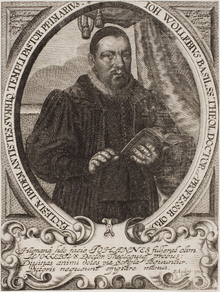Johannes Wolleb

Johannes Wolleb (Wollebius) (1589–1629) was a Swiss Protestant theologian. He was a student of Amandus Polanus, and followed in the tradition of a Reformed scholasticism, a formal statement of the views arising from the Protestant Reformation.[1]
He was the successor of Johann Jakob Grynaeus at Basel Cathedral. The Compendium Theologiae Christianae of 1626 is his major work; it is shorter than the Syntagma Theologiae Christianae (1609) of Polanus, and served as an abridgement and development. It was translated into English by Alexander Ross, as Abridgement of Christian Divinitie (1650).[2]
Wolleb influenced the Westminster Shorter and Larger Catechisms.[3] His Compendium, with William Ames's Medulla, and Francis Turretin's writings, were used as textbooks into the 18th century and beyond.[4] In the late 17th century, Wolleb's system began to displace Ames's in favour at Harvard University.[5] Students at Yale University in the early 18th century used to study the Abridgement every Friday afternoon;[6] the books by Wolleb and Ames were written into the university Regulations (1745).[7]
Notes
- ↑ John Wheelan Riggs, Baptism in the Reformed Tradition: An Historical and Practical Theology (20020, p. 87.
- ↑ http://www.ccel.org/ccel/schaff/encyc12/Page_407.html
- ↑ Donald K. McKim, David F. Wright, Encyclopedia of the Reformed Faith (1992), p. 398.
- ↑ Ernest Gordon Rupp, Religion in England, 1688-1791 91986), p. 176.
- ↑ Amy Plantinga Pauw, "The Supreme Harmony of All": The Trinitarian Theology of Jonathan Edwards (2002), p. 61.
- ↑
- ↑ http://www.constitution.org/primarysources/yale.html
Further reading
- Geoffrey W. Bromiley, Historical Theology: An Introduction (2000), pp. 324–8.
External links
- Matthias Freudenberg (1998). "Johannes Wolleb". In Bautz, Traugott. Biographisch-Bibliographisches Kirchenlexikon (BBKL) (in German) 14. Herzberg: Bautz. cols. 47–50. ISBN 3-88309-073-5.
- Works by Johannes Wolleb at Post-Reformation Digital Library
- Wolleb, John (1660) [1626]. Christianæ theologiæ compendivm [The Abridgment of Christian Divinitie] (in Latin). Translated by Alexander Ross. London: T. Mabb for Joseph Nevill.
| Religious titles | ||
|---|---|---|
| Preceded by Johann Jakob Grynaeus |
Antistes of Basel 1618–1629 |
Succeeded by Theodor Zwinger the Younger |
|